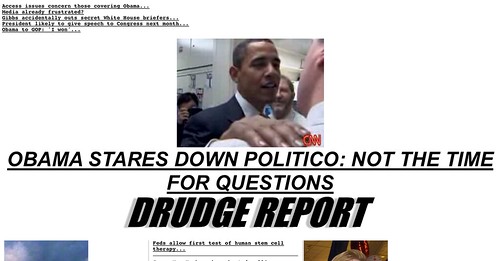
And here's the article at Politico the headline links to. An excerpt:
President Barack Obama made a surprise visit to the White House press corps Thursday night, but got agitated when he was faced with a substantive question.
Asked how he could reconcile a strict ban on lobbyists in his administration with a deputy defense secretary nominee who lobbied for Raytheon, Obama interrupted with a knowing smile on his face.
"Ahh, see," he said, "I came down here to visit. See this is what happens. I can't end up visiting with you guys and shaking hands if I'm going to get grilled every time I come down here."
I knew that conservatives, closet and otherwise, would try to burnish the cred early by taking shots at Obama. But these people need to learn how to keep their powder dry.
Obama is a pretty disciplined guy. And he has to be doubly careful: as much as he represents a repudiation of the Bush years, Obama still lives in their shadow, with all the cynicism they bred. But, in spite of that discipline and caution, he'll still screw up eventually. Or, events will conspire to make him look bad, even if there's nothing he could have done.
His opponents should wait for those opportunities. Because right now, with articles criticizing Obama for doing a meet and greet with reporters where he didn't want to answer big questions, well, this just looks a bit silly. It looks like a desperate play by people who are afraid that if they don't do something to knock him off this pedestal, Obama's popularity will never wane.
Of course, people like me are afraid that Obama won't find a way to turn this impossible economic situation around, and that he will eventually be pilloried, regardless of what he does.
Edited to add: The portion of the picture you can't see above, at the end of the first line of the headline, says "The Time." I can't find a way to get it all in there, but if you click on the picture, you can see the whole thing. I apologize for my technological incompetence.